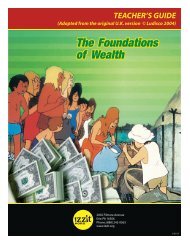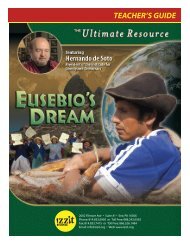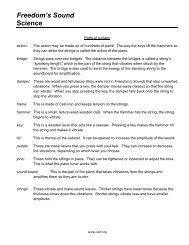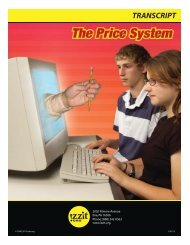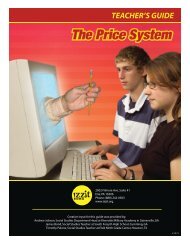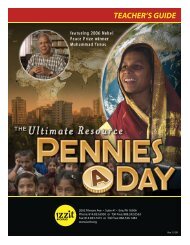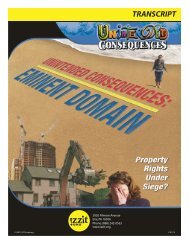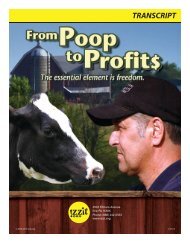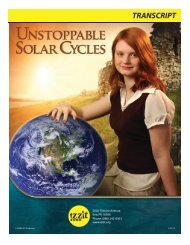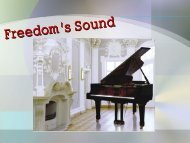Transcript - Izzit.org
Transcript - Izzit.org
Transcript - Izzit.org
Create successful ePaper yourself
Turn your PDF publications into a flip-book with our unique Google optimized e-Paper software.
TRANSCRIPT2002 Filmore AvenueErie, PA 16506Phone: (888) 242-0563www.izzit.<strong>org</strong>© 2012, 2013 izzit.<strong>org</strong>V. 01/13
A Taste of Chocolate<strong>Transcript</strong>For a list of additional resources to use with this video go towww.izzit.<strong>org</strong>/products and click on the A Taste of Chocolate video.KATIE HU: Hello! I’m Katie Hu, though to most of my family, I’m Hu Ge Juen.Hu Ge Juen…I like the sound of that. You see…like you, I’m a student. But unlike you,or most of you, I’m an American of Asian descent, an Asian-American. There are overseventeen million of us in the United States today, and tomorrow…there will probably bemore. That’s because America has long been the land of opportunity for immigrants, likemy parents from Taiwan.Growing up, both of my parents were very poor, but after moving to the United States,my father trained in the art of Asian cuisine under a master chef. And mymother…always good with numbers, managed their finances and began saving theirmoney. Eventually, they invested that money into a restaurant of their own. And today,after over sixteen years of successful ownership, they’re both retired.My parents came here to seek a better life, and I like to think I’m proof that theysucceeded. I think you’ll agree that the impact of immigrants from all over the worldon America has been amazing! For example, did you know that Google, YouTube,Yahoo! and eBay were all cofounded by immigrants? They came from Russia, Germany,Taiwan and elsewhere. A Cuban immigrant made Coca-Cola into a top Americancompany when he became its president and CEO in 1980. And back in the 1920s,it was immigrants from Eastern Europe who created Hollywood.So, how is it that so many immigrants who came to America became so successful?I think you already know the answer: it’s freedom. Every year, there’s a foundationin Washington, D.C. that rates the freest and the least free countries of the world.The freest countries are those with the greatest economic freedoms. And at the top of thelist is tiny Hong Kong, even though today Hong Kong is part of China.In this video, you’ll meet a fascinating man who took advantage of all of the freedomshe found in Hong Kong. But as you’ll see…his success was not without great risk. Ithink you’ll really like the amazing story of Jimmy Lai.NARRATOR: Hong Kong – one of the richest and freest places in the world – where a“hands-off” government policy has long encouraged private investment andentrepreneurship. Of Hong Kong’s many entrepreneurs one man stands apart…a selfmademaverick who heads a vast business empire worth millions of dollars –a family1
man at peace with himself who, day in and day out, is driven to succeed. His name isJimmy Lai… and this is his amazing story.Jimmy Lai was born in Guangdong Province, in the city of Guangzhou – once calledCanton. He was five when Mao Tse-Tung’s Communist Revolution reached the area.His family’s property was stripped away, their lives decimated.JIMMY LAI: It was very confused time for kids. I didn’t know what was going on. Iwas maybe four. Well, we were unfortunate because our family was rich family, sonaturally, when you are rich, you become the enemy of the people. When I knewanything, I knew that the adults were very busy either being sent to labor camp. Youknow, for instance, my mother only came back during weekends to take care of us. Afterweekends, she had to go back to labor camp. And at that time, you know, me and mytwin sister and my eldest sister- only three of us were still in Canton in the house. So, wewere young kids…left with us. We had to cook ourselves and all that. We just had tosurvive, struggle, as a kid. Although, you know, luckily we were kids, so we didn’t knowanything better.NARRATOR: Jimmy was nine when he went to work in a railway station – carryingluggage.JIMMY LAI: It was an experience that was very educational for me. It changes mypurview of the world. One day I was carrying the baggage for a guy. After, gave me,you know, gave me some tips, he felt into his pocket and gave me a bar of chocolate. Ihad the bar of chocolate in my hand, I turned, and I was so hungry, you know, I turnedand I bite, and it was so tasteful! It was, it was amazing. And so I turned and I askedhim, I said, “What’s this?” “It’s chocolate.” I said, “Where you from?” He said, “HongKong.” I said, “Hong Kong must be Heaven because I never taste anything like that.” Sothat really, that was, that trigger my determination to go to Hong Kong. And then fromthat day on…I pestered my mother to allow me to escape.NARRATOR: The taste of chocolate fueled young Jimmy Lai’s imagination, althoughhe could not have imagined the dramatic differences between his homeland and thefreedom in Hong Kong.JAY RICHARDS: Communist China in the 1950s and ‘60s had a command and controleconomy, in which entrepreneurial decisions and visions, and choices were not preserved,or not respected.FRANK HANNA: When no one can rely on the rule of law and the rights of property,pure logic tells you not to invest too much of your time, and energy and resources intoany property.PETER BOETTKE: The biggest impediment to economic growth is when people feelthe threat of confiscation of their gains, from wealth-creating activity through eithergovernment or other private actors. And so, for example, in the third-world, there’s a2
lack of stability…from both the government confiscating your wealth, and your neighborconfiscating your wealth.NARRATOR: As a 12-year-old, Jimmy Lai knew nothing of economic theory. But inthe Guangzhou train station, he had tasted economic freedom.JIMMY LAI: I start to pester my mother about allowing me to escape to Hong Kongwhen I was eleven and a half. So it took me a year to convince her. She always said that,“You know that going to Hong Kong is like you going to the moon, because I will neversee you again!” You know, she thought I would never be able to go back, and she wouldnever go to Hong Kong to see me. And she was very reluctant to allow me go to HongKong, but finally I did when I was twelve and a half.NARRATOR: Jimmy knew a policeman who got him a visa to Macao on China’s Southcoast. That night, he began the journey that would change his life forever.Some of the Macao fishermen were part of a smuggling operation where freedom andprofit met.JIMMY LAI: I was put in the bottom of the junk, a fishing junk, together with likemaybe a 100, maybe 80, I don’t remember…you know? We were crammed together andafter a few hours, they allow us…you know, when they see no boat there, they allow usto have some fresh air and then heh…went back to the bottom and everybody vomitingbecause, you know…and by the afternoon, we arrive in Kowloon. And at that time,when you arrive in Hong Kong, you touch base…you’re legalized, you know? You’reconsidered legal. I was taken to my mother’s sister and she paid 370 dollars for thesmugglers. Later, I found out how poor my mother’s sister was. You know, she and herhusband was living in a bed among many beds in a compound, so they had the foodcooked next to the bed and all that. You know, they were very poor people.NARRATOR: Their poverty meant that Jimmy was sent to work the same night hearrived in the Kowloon District of Hong Kong.JIMMY LAI: I was taken to a factory to work as an odd-job worker, and I was veryhappy in the morning. You know, I smelled a lot of food that I never smelled; youknow…the great aroma of food. And the manager gave me ten dollars. That…that was alot of money at that time, and I was very happy, as if I arrived in Heaven. Although, youknow, as a…as a young kid, we had to wake up, like, before seven. We got to sweep thefloor, finish everything, open the door before eight o’clock. People come, and then wework until like ten o’clock, but it was a very happy time. It was a time that, I know I hada future. I know…you know I knew I was chosen.NARRATOR: He soon noticed that those who were getting ahead spoke English. Hefound an old man to teach him the rudiments of the language and by the time he left thefactory, Jimmy could read and converse in English. He was fourteen.3
Four years later, he became a garment salesman and his work eventually took him to NewYork City.JIMMY LAI: It was almost like, you know, what I…what I saw in movies: bigbuildings, you know…big cars. It was…it was a wonderful time. You know…it wasvery constructive. I learned almost everything I learned to build the foundation of my lifefrom there, you know. Well, I had a mentor who was…who was a very good salesmanthat I met. And actually, I stayed with him and his wife. So, one day he told me, he“Look, Jimmy, I taught you everything you need to know as a salesman. If you want togo further in the life, you’ve got to be educated; you’ve got to have an internationalpursuit. I’m going to take you to one of my friend’s house for dinner tonight.” It was1967. It was a Tuesday night. I was invited to a retired Jewish lawyer’s house fordinner. After dinner, because during dinner I was speaking rubbish, so when I left, hetook a book from the bookshelf, and gave it to me and say that, you know, “Read this.It’s good for you.” And the book’s name is called, The Road to Serfdom by FriedrichHayek. The book changed my life.NARRATOR: Austrian economist Friedrich Hayek had written The Road to Serfdomnear the close of World War II. He argued that the same collectivist impulse that drovenational socialism in Germany, and communism in the Soviet Union also threateneddemocracies like Great Britain. He warned that freedom could not long survive the state’sattempt to centrally plan its economy. Hayek predicted that if a democracy followed sucha path to the end, it would “inevitably destroy itself.”JIMMY LAI: You read between the lines of his passion for freedom. It’s almost likereligious. You know, this is fantastic. This is so uplifting for me.NARRATOR: For Hayek, the state, not just individuals…could violate the rule of law.He maintains that government efforts to dictate economic equality did not extend the ruleof law but destroyed it. Hayek compared the rule of law to a state providing road signs,but without “commanding people which road to take.” Only if the state accepts its limitedrole can real freedom prosper.The book’s passionate case for freedom lit a fire in the young salesman. On his return toHong Kong, Jimmy Lai landed a job as a manager in a garment factory. It would be awatershed year.JIMMY LAI: I got a bonus of seven-thousand Hong Kong. It was not enough to start abusiness. So I said, I said, “Ok, look, let’s try my luck, and speculate in the stock market,if I’m lucky, I’ll make some money, then I start my own business.” And then, before Idid it, I bought a lot of books, about you know, stock market books, to know how tospeculate.NARRATOR: Jimmy Lai proved himself an astute investor and quickly built a nest egg.With his profits and help from a friend, he soon had the capital to think big.4
JIMMY LAI: I really like to create things. I got a rich friend of mine, who was mypartner; whose father can sign a personal guarantee to get some money from the bank.So that’s, that’s works out, and then that’s how I build the factory, and then I went intothe retailing business.NARRATOR: In 1981, he founded a clothing chain, which he named “Giordano” afteran Italian restaurant in the United States. The company quickly expanded from HongKong into mainland China. Within a decade, there were over two- hundred “Giordano”stores worth hundreds of millions of dollars.Jimmy Lai had made it…in one of the most competitive clothing markets in the world.And then, suddenly, everything changed.The young, incredibly successful entrepreneur became emotionally involved with thepro-democracy demonstrators under brutal attack by their government in TiananmenSquare. It was 1989.JIMMY LAI: When I first noticed what happened in Tiananmen, I was very moved. Ialways trying to run away from China since the time that I escaped from it. AnythingChina represent is something that I want to f<strong>org</strong>et. I want to be keeping as long adistance from it as possible, at least emotionally. It’s something becoming verydisgusting for me.Actually, I didn’t feel anything about China until Tiananmen Square happened. All of asudden, it’s like my mother was calling in the darkness of the night. And my heart openedup. It’s like going back to the warmth of your mother. I was very excited. I wanted toget involved. So I gave money, I gave t-shirts. I do a lot of things. I had banners in myshop; you know…“Ask Deng Xiaoping resign.” And printed those Tiananmen Squareheroes t-shirts, and sold it at a very cheap price. I was doing a lot of things. I gotinvolved and I was very excited, and that’s why I went into the media business.I asked myself, you know, “I’ve made enough money. If I just go on making money…itdoesn’t mean anything to me.” But if I go into the media business, then I deliverinformation, which is choice, and choice is freedom. You know, I was thrilled by theidea you know, that I could be part of the institution that is delivering freedom to asociety like China. Of course, that…which was a misconception. I thought China afterthe June fourth massacre would be opened up to the world and to freedom for its people.It hasn’t yet.NARRATOR: Hong Kong media avoided criticism of the Communist leadership. Butnot Jimmy Lai. He refused to play it safe and publicly criticized Premier Li Peng for hisrole in the Tiananmen Square Massacre. It was a fateful decision.JIMMY LAI: I wrote a letter, an open letter to Li Peng and said some harsh things abouthim. We had shops in China and we were frightened that you know…we, you know that,if I still owned the company, they’re going to close down the shops in China. So, the one5
day, I was in Paris in the morning, 6:30, and I receive a call from the then CEO sayingthat, “Look, Jimmy, you got to sell your share in the company. The greatest potential isin China, and if we, you know, if all doors close there, we’re finished, we’re toast.” So Isaid, “Go ahead, sell it.”NARRATOR: It was a year after the Chinese government forced him out of his owncompany that Jimmy Lai changed course. He launched a newspaper, Apple Daily.Undeterred by the attack on his interests, Lai pushed his writers to create a blend ofconsumer and muckraking journalism.There were some costly setbacks, but a decade later the entrepreneur expanded intoTaiwan. Jimmy Lai continued to take risks, and once again was at the top of his game.“Apple” and “Next” soon became leaders in the crowded Hong Kong and Taiwanesemedia markets.Only in a free society can an entrepreneur succeed. Jimmy Lai succeeded because hebelieved in himself and in the future, and because he was willing to take risks.JIMMY LAI: I learned risk without knowing there is a risk. Taking risk is actuallydashing into hope. You’re just dashing into the future, and hoping that it’s going to bebetter.For a list of additional resources to use with this video go towww.izzit.<strong>org</strong>/products and click on the A Taste of Chocolate video.6
We are very interested to learnhow you use our material. Pleaseshare your experiences or lessonplan ideas by visiting usat www.izzit.<strong>org</strong>.2002 Filmore AvenueErie, PA 16506Phone: (888) 242-0563www.izzit.<strong>org</strong>



